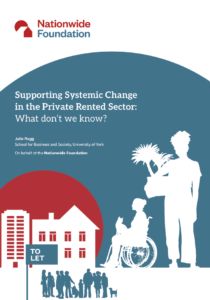Today (5 February), we have launched the first of several reports as part of an ongoing project that has the potential to support genuine transformation of the private rented sector (PRS).
Supporting Systemic Change in the Private Rented Sector: What don’t we know? is a systematic review of research gaps in the PRS. This new report,  which delves into existing knowledge of the sector, is important reading for anyone interested in research into the PRS or wider housing system. It will set the direction for the rest of our significant and long-term research project.
which delves into existing knowledge of the sector, is important reading for anyone interested in research into the PRS or wider housing system. It will set the direction for the rest of our significant and long-term research project.
The research, completed by Julie Rugg from the University of York, has discovered that there are numerous gaps in knowledge of how the PRS functions. These range across eight broad subject areas:
- The PRS within the housing market
- Expanding responsibility for ensuring that the PRS meets property standards
- Emergent letting practice
- Local authorities and proactive sector management
- Understanding market subsectors
- The contribution of larger landlords
- Tenants vulnerable to harm in the PRS
- PRS stock and retrofitting
The report delves into each potential research area and provides suggested questions for researchers to explore. It also provides an overview of policy development in the PRS and a review of those areas which are already well-examined.
The challenges in the PRS are significant and well known but are compounded by a general lack of understanding of much of the sector, including what it is that drives problems to exist, and crucially what changes might be made that could improve the sector. If research gaps are not filled, changes to regulation and funding may be ineffective.
In publishing this report, we want to encourage those funding or conducting research to have a clear picture of what more could be known about the PRS, and to work together more effectively on filling these gaps.
‘The PRS is changing. It’s wise to focus research funding on those areas where we need fresh data that will help us understand new trends and practices.’ – Julie Rugg
Our research agenda
At the Nationwide Foundation, we are working to transform the housing system so that it works for all – now and for generations to come. As part of our Transforming the Private Rented Sector programme, we have decided to fund this long-term substantial research, not just to fill gaps in knowledge, but to support our wider efforts to change the PRS and the housing system, to ensure everyone has access to a decent and affordable home.
Across multiple phases, we will fund research into areas where an increased understanding is the most likely to lead to long-term systemic change in the PRS, and where we can produce clear and actionable recommendations for changes to policy and practice.
What comes next?
In the next phase, we will fund research into important but under-analysed actors in the sector, which were identified as top priorities through this report:
- The role and behaviour of letting agents.
- Establishing the scale and impact of the mediated market (those areas of the PRS where letting is arranged via an intermediary agency, for example temporary accommodation for homeless households or people seeking asylum).
- Assessing the local impact of build to rent.
Future phases of the research programme will explore commissioning research into some of the other subject areas identified in the report.
We will provide further information in the coming months about our approach to this research. If you want to be kept updated, please contact Joshua Davies [email protected].

